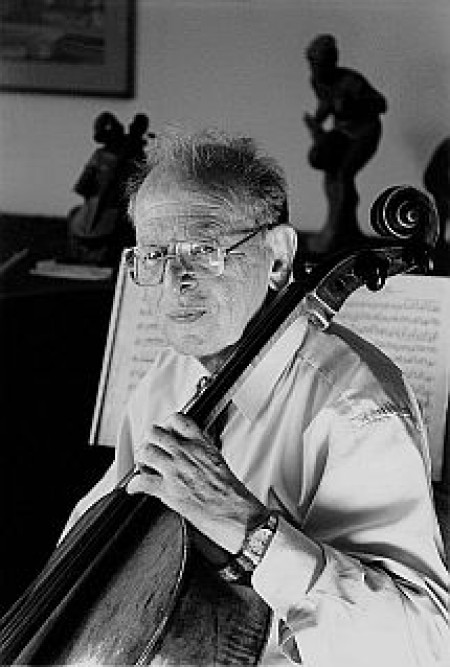
6 April 1917, Budapest – 23 June 2004, Budapest
Ede Banda comes from a distinguished family of famous Gypsy musicians. The Bandas appeared in the history of Hungarian music as early as the first half of the 19th century. The father of the famous Marci Banda senior played in János Bihari's ensemble; Marci Banda senior was the star Gypsy bandleader of the second half of the 19th century; and his son, Marci Banda junior, was a world-famous musician at the turn of the century. Countless recordings were made in Berlin of his playing from the 1910's onwards. Ede Banda, coming from a sideline of this famous family, was the second among who Bandas who – following his older brother – chose a career in classical music. Not only his father, but his mother also had a fine musical sense.
Ede Banda's musical talent, particularly his legendary perfect pitch, manifested itself very early. He began to play the piano at first, turning to the cello – on his brother's advice – only rather late, at the age of thirteen. Compared to the born geniuses, he was also rather late in deciding to have a musical career. He studied with Jenő Kerpely, Adolf Schiffer and Miklós Zsámboki at the Music Academy from the 1934/35 to the 1941/42 academic year. It was possible to learn from these three masters the contemporary instrumental techniques and tastes of performing on the cello. The young musician, however, was not content with that. He also assiduously attended the classes in music history and music theory, and had a particularly close relationship, initially as pupil, later as friend, with Leo Weiner, from whom he learned, besides chamber music, high-level music theory and analysis. During his years at the Music Academy, the marvellous art of its director, Ernő Dohnányi, and the music and pedagogical aura of Zoltán Kodály had a decisive influence on him. His career encompassed all the activities of an instrumental musician: between 1940 and 1951 he was principal cellist in the Budapest Municipal Orchestra, the Hungarian Radio's soloist and chamber musician, and from 1951 throughout the ensemble's existence, a member of the Tátrai String Quartet. From the 1948/49 till the 1995/96 academic year he taught the cello at the Music Academy, and from 1982 onwards also headed the chamber music department. Many of his one-time pupils have had successful careers in Hungarian and international musical life, among them Miklós Perényi, Mihály Virizlay, Mária Frank, Pál Banda, etc.
The development of the special musical gifts in Ede Banda's art was greatly facilitated by his exceptional musical knowledge. His music – particularly as a chamber musician - was characterised by analysis and inspiration, conscious preparation and improvising playfulness. His instrumental playing was determined by a refined sense for a beautiful sound, familiarity with the different styles, and a richness of accents and phrasing. The polished interpretation, down to the tiniest detail, strongly resembles the way in which Banda's respected master, Leo Weiner, composed. This was the secret and the value of his teaching as well. He made his pupils aware of the function and significance of each note. He taught the profession in its entirety, the one and indivisible music, whose practical-technical tools and theoretical-analytical aspects strengthened each other as they led him and his pupils towards the morally pure performance of the music.
He was awarded the Kossuth Prize (1958), the titles, Meritorious Artists (1969) and Outstanding Artist (1973), and the Béla Bartók-Ditta Pásztory Prize (1985).
Batta András


